 The Review: Broadway’s Carousel and the Lincoln Center Theater’s My Fair Lady.
The Review: Broadway’s Carousel and the Lincoln Center Theater’s My Fair Lady.
By Ross
It’s all about the girls. Oops, my apologies, I meant to say, young women that are headlining two musical revivals gracing Broadway this season. Both glorious, with one, Jessie Mueller, not surprisingly amazing, and Lauren Ambrose, throwing us all for a loop. We all knew Mueller is graced with extraordinary musical chops, wowing us most wonderfully in Beautiful and Waitress, but most of us were unaware of Ambrose, unsure and wondering what the fuss was all about. The powers that be have been trying to get her to headline a musical for a while, and I could never fully comprehend why. She was wonderful in the television show, “Six Feet Under“, that we can all agree, and I always thought her acting ability was her finest strength, as did many of my followers and friends, so I was  shocked as many of us were, to find out that maybe, she is much more of a singer than any of us could ever imagine. I mean, I saw her in Central Park in The Public’s Romeo and Juliet, playing a wonderfully gentle and fierce Juliet (and if my memory serves me correctly, I believe the rain came down on this lovebird just as she was swallowing her potion, and for that one night, as it was announced over the P.A. system, the two lovers would live, as the performance was halted) and she was also just as magnificent in LCT’s Awake and Sing! and Broadway’s Exit the King, but her vocal performance at the Lincoln Center Theater left me slack-jawed.
shocked as many of us were, to find out that maybe, she is much more of a singer than any of us could ever imagine. I mean, I saw her in Central Park in The Public’s Romeo and Juliet, playing a wonderfully gentle and fierce Juliet (and if my memory serves me correctly, I believe the rain came down on this lovebird just as she was swallowing her potion, and for that one night, as it was announced over the P.A. system, the two lovers would live, as the performance was halted) and she was also just as magnificent in LCT’s Awake and Sing! and Broadway’s Exit the King, but her vocal performance at the Lincoln Center Theater left me slack-jawed.
That being said, most musicals center their story and our gaze on the loverly female lead, especially these two old school musicals; the 1956 My Fair Lady and the 1945 Carousel. And in that focus, both of these gorgeous classic musicals, along with the later play, Children of a Lesser God, which is currently getting a lopsided revival at Studio 54, enter the Broadway scene sharing some problematic gender imbalances, awkward power dynamics, and abuse issues to figure out. And with the current #MeToo climate hanging over their concerned heads, both of these musicals delicately and intelligently found their way through the controversy, but sadly, Children did not. Check out my review of that play by clicking on the title to find out exactly why I would say such a thing.

But in the land of classic Broadway musicals, the power dynamics and the ideas of control give pause to many when they think of a modern revival of My Fair Lady. The memorable musical is based on George Bernard Shaw’s Pygmalion, an equally famous play that I have never had the opportunity to see, with book and lyrics by Alan Jay Lerner and music by Frederick Loewe. I recently watched two uniquely different short one-act operas presented by the NYC Opera based on the same Greek myth of Pygmalion (Donizetti’s Il Pigmalione/Rameau’s Pigmalion) that gave Shaw his inspiration in hopes to find the essence of the story, only to find that the concepts presented add a complicated layer that isn’t so soothing to our present mindset. In the myth (and within these two operas), a sculptor falls desperately in love with his perfectly created statue of a beautiful woman. The Gods, swayed by his adoration, bring the statue to life, and the love between them is powerful and unquestioned. The newly created flesh and blood woman, naturally, falls in love with her creator, and the sculptor just has to open his arms for her to fall into. Abstractly, this is what Shaw brought into his Eliza Doolittle, quite ingeniously, as did Lerner and Loewe (Camelot, Gigi). The statue became a Cockney flower girl who takes speech lessons from the older and much wealthier professor Henry Higgins, a phoneticist, so that she may pass as a lady and he may win a bet. And they fall in love, or at least he thinks he does, but does she? That I must say is the question on everyone’s lips as the final scene approaches, but it is the romantic ideal that still prevails and how most want to see it end.
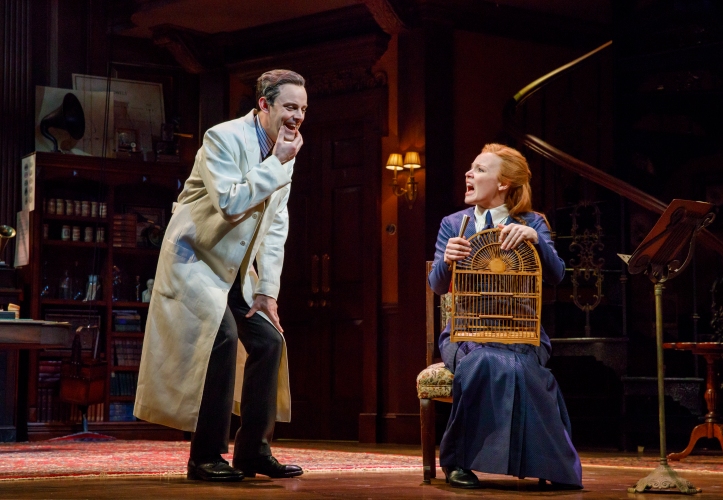
Ambrose is glorious in the part of Eliza Doolittle. “She’s so deliciously low! So horribly dirty!“, standing quite tall, eye to eye and at somewhat of an equal footing with the young and equally magnetic Harry Hadden-Paton (West End’s The Importance of Being Earnest, TV’s “The Crown“, “Downton Abbey“) as the stuffy and slightly arrogant Professor Henry Higgins. Their chemistry is strong, and although, as written, their interactions heavy with troubling dynamics of unequal power, the two, somehow, through their performance with assistance from some solid and smart editing and good casting choices, the production manages to not make it feel creepy or lecherous, like the thoughtless Children of a Lesser God. First off, giving the part of Higgins to a younger actor, with the solid acting skills of Hadden-Paton has done wonders to the dynamic, and as directed with a sheer genius by Bartlett Sher (Oslo, King and I), Ambrose delivers us a Doolittle that one doesn’t necessarily feel like she is in need of protection. Her father, a Mr. Alfred P. Doolittle, played hilariously by the wondrous Norbert Leo Butz (Broadway’s Big Fish, Catch Me If You Can, Signature’s The Whirligig) somehow, without him consciously and purposefully realizing it, created quite the fireball of a daughter. He himself doesn’t do too bad either in his most magnificent performance; charming us quite devilishly with his wonderfully funny show stoppers. “With a Little Bit of Luck” has implanted in it that adorable little jig that is beyond description, telling us everything we need to know about this scalawag, and he does it with such charm and wonderment that it makes perfect sense that Higgins labels him the way he does, altering his life in a very funny and unforeseen manner.

With the sweeping gorgeousness of the music, courtesy of the stunning musical arrangements by Robert Russell Bennett and Phil Lang, and music direction by Ted Sperling (LCT’s The Light in the Piazza); to the loveliness of the scenic backdrop, courtesy of the extremely talented design team made up of sets by Michael Yeargan (Broadway’s The Ritz); costumes by Catherine Zuber (LCT’s Junk); lighting by Donald Holder (Broadway’s M. Butterfly) and sound by Marc Salzberg (LCT’s War Horse), Eliza Doolittle with her “Wouldn’t It be Loverly?“, gives us just that, drawing us in with her beautiful voice that is equal to or slightly reminiscent of a Julie Andrews or the legendary Marni Nixon, the singer who most famously sang the songs that Audrey Hepburn lip-synced to in the 1964 film version. This Eliza doesn’t need the help of a phantom voice, nor does she require the watchful care of the gentle Colonel Pickering, played by the barely present, Allan Corduner (Broadway’s Titanic); luckily, as this Colonel doesn’t seem as invested in her care as I remember wanting him to be. Nor does she seem to need the young and handsome Freddy, gloriously sung by the impeccably voiced Jordan Donica (Raoul in Broadway’s The Phantom of the Opera), to sweep her to safety in the end; luckily, as this Freddy seems to disappear personality-wise whenever he stops singing. But she does need and happily embrace the warm maternal care of Mrs. Higgins, played with a regal charm by the magnificent Diana Rigg (Broadway’s Medea, The Misanthrope), following in the loverly theatrical tradition of casting an actress who had once played the part of Eliza, namely the 1974 West End production of Pygmalion. For in Rigg’s Mrs. Higgins, Eliza finds another strong and like-minded woman who most definitely understands her.
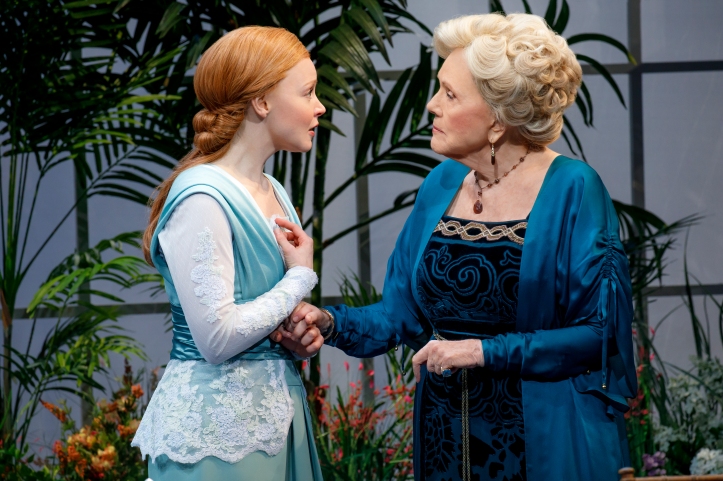
The ending, ambiguously crafted by Lerner and Loewe, lets the director find the way to whatever resolution seems to fit with his viewpoint and vantage. The moment of possible reconciliation that might possibly take place between Higgens, the teacher and Doolittle, the pupil, is problematic in this day and age. What would this #MeToo culture have to say in response to a Higgins that slouches and asks, “Eliza, where the devil are my slippers?” Would it run or would it come forward? In the 1964 film version, Rex Harrison’s Higgins looks surprised then pleased before asking for his slippers as the stunning Audrey Hepburn’s Eliza smiles on behind him, leaving us all to wonder what happens next. This Lincoln Center Theater production is less ambiguous with her reaction, and without giving anything away, stays clear of a damning situation. This Eliza makes a decision.
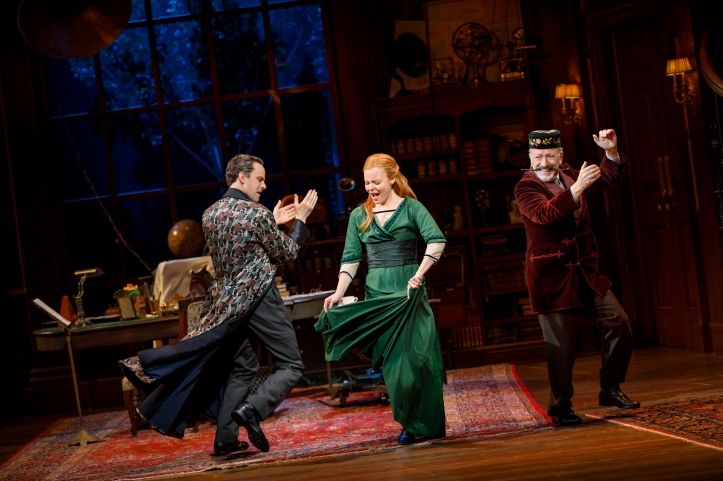
One magnificence that truly jumps out and impresses during this current revival is how much fun the poor folk are having living the life that they lead, especially in comparison to the rich. In song after song, especially the two best numbers, “Wouldn’t It Be Loverly?” and “Get Me to the Church on Time“, the “deliciously low” are “squawking” with such delight that we can’t help but want to join in with their good times. The choreography by Christopher Gattelli (Broadway’s War Paint, Spongebob SquarePants) lifts us all up in their joy, even in the funeral procession that hilariously ends that one fantastic number. It is in sharp contrast to the rigid but visually stunning work done at the “Ascot Gavotte” and “The Embassy Waltz” where fun comes in a different structure and doesn’t seem natural to these stuffy creatures. It’s all presentation and appearances. I wouldn’t want to dance, dance, dance all night with the likes of those beautifully clad fancy folk, but would, if I could, dance the night away drinking beer with that fun gaggle of gents, lead by the rascal, Mr. Doolittle, Harry (Joe Hart), Jamie (Lance Roberts) and company over at the Pub. I might lose my wallet, but I’d leave with a good time smile.
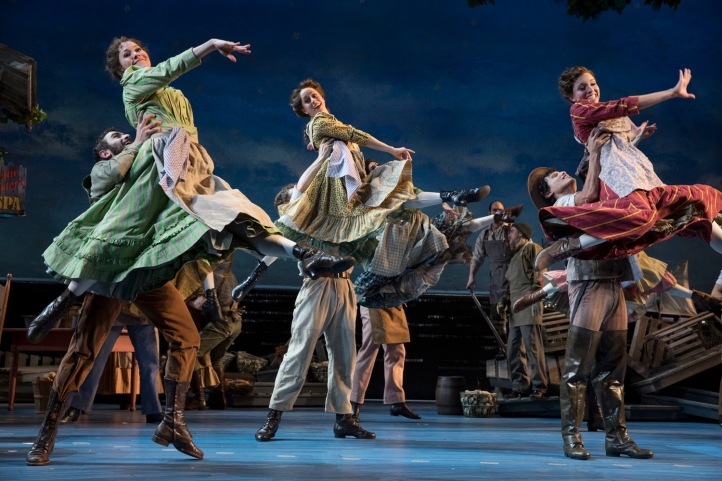
Over at the Imperial Theatre, in the more traditional region of the Broadway musical, Rodgers and Hammerstein’s Carousel is also getting a first-rate revival, enjoying “A Real Nice Clambake” hosted by the magnificent Renée Fleming making her Broadway musical debut as the kind and lovely Aunt Nettie Fowler. Even with the festive aura attached to this song (interestingly, this song was repurposed and adapted from “A Real Nice Hayride“, written for Oklahoma! but not used), this party doesn’t feel as festive for its two lead characters and their friends, as it does over at the Lincoln Center for Mr. Doolittle and his as he jigs his way through his last night as a single man. This production, with the famously beautiful music by Richard Rodgers and book and lyrics by Oscar Hammerstein II (Show Boat, Oklahoma!) is as dark and as romantically moody as the classic piece demands. And just like My Fair Lady, it also has some troubling issues of its own to deal with locked down inside the text.
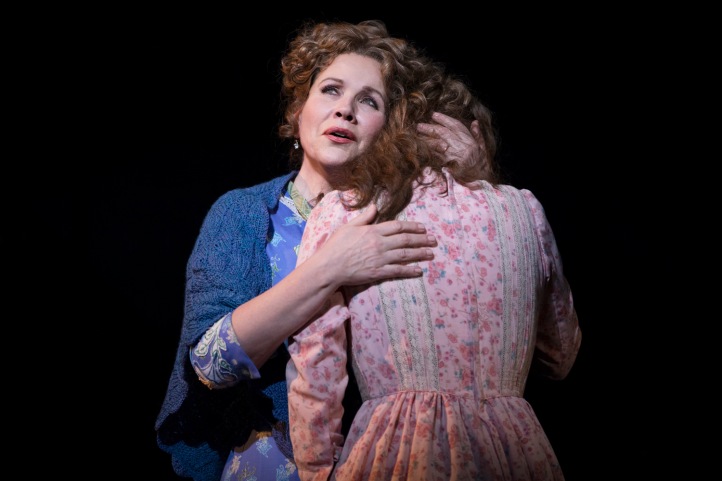
Rodgers, in writing Carousel, dispensed with an overture, forcing us all to be swept up by the magnificent set piece swirling around the glorious pantomime dance introduction, “The Carousel Waltz“. The splendid set, by designer Santo Loquasto (Broadway’s Grand Hotel), with brilliantly detailed costumes by Ann Roth (Broadway’s The Nance, The Book of Mormon), moody and sparkling lighting by Brian MacDevitt (Broadway’s Blackbird), and sound by Scott Lehrer (Fiddler on the Roof) beautifully introduces all the characters and situation expertly, drawing us in to the intensity with which Julie (Mueller) regards the sensual and handsome Billy, most magnificently portrayed and sung by the incredibly talented Joshua Henry (Broadway’s Shuffle Along…, The Scottsboro Boys). She stands frozen, staring at him, while everyone else at the fair is circling around, enjoying the sea side air. As Julie and Billy ride the swirling carousel together, touching for the first time, the stage is set, plunging us into the story, right into the middle of it, delicately and gorgeously.
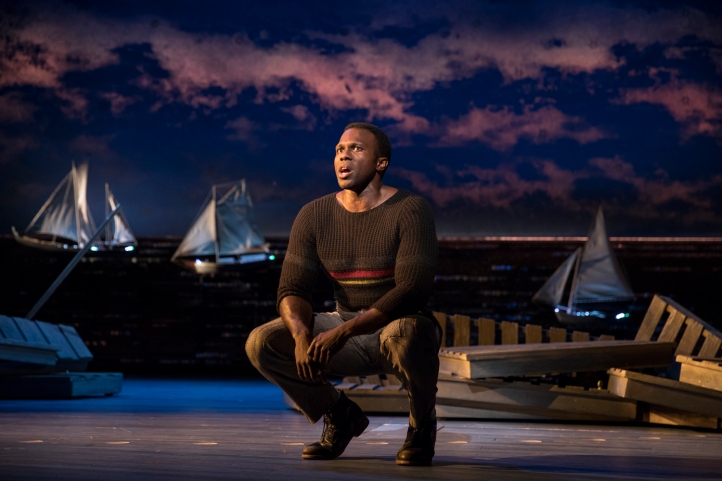
Director Jack O’Brien, best known for his Tony winning The Coast of Utopia and the underwhelming Broadway musical, Charlie and the Chocolate Factory, still had to find a way to deal with the lead male character and his unsympathetic actions. Billy seems to have trouble engaging and seeking help from the woman he loves, lifting his hand in violence whenever overwhelmed with stress and agitation. It’s his uncontrollable curse, this inability to cope and manage his emotions, and in some ways, it is also the curse of this complicated and dark musical.
Carousel was adapted by this legendary musical team from Ferenc Molnár’s 1909 play Liliom, which chronicled a dismissed carnival barker who hits his wife, just the one time, attempts a robbery and commits suicide, a seemingly unlikely central character for a musical. Hammerstein decided that he had to use the words and story to make the audience sympathize with the lovers, transplanting its Budapest setting to the Maine coastline, and change the ending of this tale into a story about trying to right a wrong and looking for redemption. Rodgers wrote, explaining his rationale for the changed ending:
Liliom was a tragedy about a man who cannot learn to live with other people. The way Molnár wrote it, the man ends up hitting his daughter and then having to go back to purgatory, leaving his daughter helpless and hopeless. We couldn’t accept that. The way we ended Carousel it may still be a tragedy but it’s a hopeful one because in the final scene it is clear that the child has at last learned how to express herself and communicate with others.
In the same way that I did some pre-show research with My Fair Lady by seeing the operas based on Pygmalion, I ventured over to the Wild Project last fall to see a modern adaptation of that Hungarian play called Jericho by Michael Weller, as I think I was the only person I know of my age group who had never seen nor heard anything about Carousel, the musical. It was a solid lesson in the intricate structure of this complicated tale, and it introduced me to the most famous and controversial piece of dialogue, one that hangs over any modern revival of this classic musical tale, when the young daughter, Louise, played stiffly (when not dancing) by Brittany Pollack, tells her mother that the blow she just received for not accepting a star from the unbeknownst spirit of Billy, miraculously felt like a kiss, not a slap. A problematic line, regardless of how many times you insist that it happened only once, the idea never loses its sting.

The story revolves around carousel barker Billy Bigelow (Henry) whose initial attraction and blossoming romance with millworker Julie Jordan (Mueller) causes them to both lose their jobs. Within minutes of meeting away from the carousel, they sing the most glorious song, “If I Loved You” to each other, that illuminates everything, and fills the theatre with a gloriousness of sound and harmony. I was quite starstruck by the wall of sound that was coming from the wonderfully rich orchestra, helmed by Andy Einhorn (Broadway’s Hello, Dolly!), musical supervisor, director and vocal arranger, with music coordination by Seymour Red Press (Broadway’s An American in Paris), orchestrations by Jonathan Tunick (Promises, Promises), and these stupendous singers. These two lead performers, along with a magnificent assist by Lindsay Mendez (Broadway’s Significant Other, Everyday Rapture) as her best friend, the lucky-in-love Carrie Pipperidge, swirl the musical moments out to the stars under this lucky proscenium. Every voice, including the wonderful embodiments of Carrie’s beau, Enoch Snow, portrayed by the solid Alexander Gemignani (Broadway’s Sweeney Todd) and Fleming’s gorgeously rich performance of “You’ll Never Walk Alone” do this music proud.

Bigelow, trapped in a down spiral, doesn’t do himself, nor the love he feels for Julie, proud at all, especially as he participates in a robbery that goes terribly wrong, all in order to provide for Julie and their unborn child. “You? A Father?” yells the wickedly delicious Margaret Colin (Broadway’s Jackie: An American Life) as Mrs. Mullin, the jilted lover and former boss of Billy, and she is more spot on in that moment than any of us can imagine. The musical, as it does in the play, shifts time and place to a moment “up there”, with “The Highest Judge of All“, and after fifteen years of punishment, he is given a chance to make things right. There is a gorgeously choreographed ballet, performed by daughter, Louise (Pollack) with a magnificently talented Fairground Boy (Andrei Chagas), created by Justin Peck (Resident Choreographer of the NYC Ballet, 2014), all now nominated for a Chita Rivera Dance Award, that set up the last scene outside Julie’s cottage. Unlike the play that it is based, one more scene is added after the failed interaction between Billy and Louise, and it is at the graduation ceremony that Billy finds a way to whisper some meaningful words into their ear, lifting them all up into a glorious reprise of “You’ll Never Walk Alone“. It’s a very different ending than the play, one that will have you leaving the theatre filled with as much glory and joy as intended, thanking all those magnificent stars that have certainly come out to play.

This is so very true of both of Broadway’s two latest revivals, Carousel and My Fair Lady. Both are deliciously repackaged, as they find their way through the brambles of the #MeToo movement, and come out the other end unscarred. Hammerstein was informed that he had written in an error involving the song “June Is Bustin’ Out All Over“, in which sheep are depicted as seeking to mate in late spring. The informant stated that they actually do that in the winter. Hammerstein stated, quite brilliantly that 1873 was a special year, in which sheep mated in the spring. This spring, on Broadway, it is also a very special year for some grand old fashioned musicals, finding their way to bask under the stars.


[…] on April 30, 2018April 30, 2018 by ross Carousel. Photo Credit: Julieta […]
LikeLike
[…] revivals of Angels in America (becoming the most-nominated play in Broadway Tony history) and Rodgers & Hammerstein’s Carousel, with Harry Potter and the Cursed Child, Parts One and Two and My Fair Lady trailing closely behind […]
LikeLike
[…] My Fair Lady […]
LikeLike
[…] Carousel […]
LikeLike
[…] revivals of Angels in America (becoming the most-nominated play in Broadway Tony history) and Rodgers & Hammerstein’s Carousel, with Harry Potter and the Cursed Child, Parts One and Two and My Fair Lady trailing closely […]
LikeLike
[…] Center Stage I, with beautifully elegant and stylish costumes by Catherine Zuber (Broadway’s My Fair Lady), warm lovely lighting by Jen Schriever (Vineyard’s The Amateurs), compelling original music […]
LikeLike
[…] the space, playing numerous roles with steadfast abandonment. With lyrics by Oscar Hammerstein II (Carousel) layered on to Bizet’s classic operatic and lush score with orchestrations by Joseph Joubert […]
LikeLike
[…] The black clad dancers, courtesy of the masterful work of Catherine Zuber (Broadway’s My Fair Lady), slink and strut their way like cats in heat around the red lit dark corners under the elephant […]
LikeLike
[…] the slightly wasted Robbie Patel, played with a nerdy sweetness by Manu Narayan (Broadway’s My Fair Lady) who is paired quite ingeniously to the speed-date dynamo, Tawney Truebody, played as true to the […]
LikeLike
[…] • Director: Bartlett Sher, (My Fair Lady) […]
LikeLike
[…] Jenna Nicole Schoen (NY’s Jersey Boys) as solo Tricia, and Ahmad Simmons (Broadway’s Carousel) as standout jock-man, […]
LikeLike
[…] Ann Roth (Broadway’s Three Tall Women), subtle lighting by Brian MacDevitt (Broadway’s Carousel), and solid sound by Leon Rothenberg (Broadway’s The Boys in the Band), this beautifully […]
LikeLike
[…] strongly by the precise Jack O’Brien (Broadway’s Carousel, The Invention of Love), this sexy slice of intellectualism and combative debate floats high in the […]
LikeLike
[…] even if you are constantly reminded of better shows from the 50’s like, The King and I, Carousel, and My Fair […]
LikeLike
[…] (Encores’ Damn Yankees), Arlo Hill (Encores’ Little Me), Todd Horman (Broadway’s My Fair Lady), and Nicholas Ward (Broadway’s Frozen), brilliantly sing them out with the gloriously grand […]
LikeLike
[…] by Bartlett Sher (Broadway’s My Fair Lady, […]
LikeLike
[…] grace. As directed by the grand master of the Lincoln Center, Bartlett Sher (Broadway’s My Fair Lady, Oslo), the words spoken are delicately and meaningfully woven together like an expert quilt-maker, […]
LikeLike
[…] a strong orchestration and new arrangement by music director, Alexander Gemignani (Broadway’s Carousel) who leads the diminutive but dynamic 8 piece orchestra with music coordinating by Meg […]
LikeLike
[…] Bella…); and Waldo, played to the max by the fun Jacob Keith Watson (Broadway’s Carousel), who also has a great time with Pinkham as the Video Store Owner and their deliciously fun dance, […]
LikeLike
[…] Douglas Thompson (Broadway’s Carousel) as the Earl of Kent, along with Dion Johnstone (Red Bull’s Coriolanus) as the Duke of […]
LikeLike
[…] penile jokes, the comedy spectacle, designed to deadly delight by Santo Loquasto (Broadway’s Carousel), with spot-on lighting by Jules Fisher + Peggy Eisenhauer (Broadway’s Pippin) and sound by […]
LikeLike
[…] by David Rockwell (Broadway’s She Loves Me), with lighting by Donald Holder (Broadway’s My Fair Lady) and sound design by Brian Ronan (Broadway’s The Prom) is pretty standard fare, to be honest, […]
LikeLike
[…] photo images of the iconic Monroe, as a deliberate and gentile Renee Fleming (Broadway’s Carousel) enters with professional purpose and ease. Payment is made, and the night’s work […]
LikeLike
[…] (Broadway’s Mean Girls), with solid obvious costuming by Catherine Zuber (Broadway’s My Fair Lady), strong lighting by Tyler Micoleau (Public’s Miss You Like Hell), and a clear sound design […]
LikeLike
[…] husband, Weston, portrayed with full frightening force by David Warshofsky (Broadway’s Carousel) had brought forth earlier this morning. “He’s the one who broke it down – he can […]
LikeLike
[…] alongside Geoffrey Rush (who won a Tony Award for his performance), Andrea Martin, and Lauren Ambrose, so I was holding my breath to see what brought her back to […]
LikeLike
[…] dressed to entice and seduce, courtesy of the masterful work of Catherine Zuber (Broadway’s My Fair Lady). They slink and strut their erotic way around the dark corners of the glorious stage like […]
LikeLike
[…] Bright Star) as playwright and diplomat Clare Booth Luce; Harry Hadden-Paton (LCT/Broadway’s My Fair Lady) as writer Aldous Huxley; and Tony Yazbeck (Encores’ A Chorus Line) as movie star Cary Grant […]
LikeLike
[…] Star) as playwright and diplomat Clare Booth Luce; Harry Hadden-Paton (LCT/Broadway’s My Fair Lady) as writer Aldous Huxley; and Tony Yazbeck (Encores’ A Chorus Line) as movie star Cary Grant […]
LikeLike
[…] man by the name of Duran, powerfully embodied by the explosive Joshua Henry (Broadway’s Carousel, Shuffle Along…), finds himself drawn in by a desperate passion for the steamy Mariana, […]
LikeLike
[…] real world staging, with Anita, lovingly portrayed by the exciting Yesenia Ayala (Broadway’s Carousel) at her dressmaking side. The white party dress, as designed by costume designer An D’Huys […]
LikeLike
[…] the young and wide-eyed Lucy Lemay, beautifully portrayed by Kerstin Anderson (Broadway’s My Fair Lady) who stands so upright and smiling that we can hardly see how one would become the other. But that […]
LikeLike
[…] as Nicky Arnstein. This was before she made her Broadway musical debut in Lincoln Center’s My Fair Lady, so I didn’t quite get the casting of Ambrose. Turns out, she has an amazingly beautiful […]
LikeLike
[…] and insane beauty of its musical expertise. I saw it for the first time in the spring of 2018 with Jesse Mueller and Josh Henry in the starring roles, and its lusciousness of wall-to-ceiling sound captivated my heart. It was a […]
LikeLike
[…] the adaptation of the film, and the Tony Award-winning choreographer Justin Peck (Broadway’s Carousel). Great storytellers, each and every one of them, taking on what many call “one of the […]
LikeLike
[…] by Santo Loquasto (Broadway’s The Iceman Cometh), with lighting by Brian MacDevitt (Broadway’s Carousel) and sound design by Scott Lehrer (Broadway’s To Kill a Mockingbird), deliver the goods as pretty […]
LikeLike
[…] an elegance in her poetic transfer of text to libretto, and director Bartlett Sher (LCT’s My Fair Lady) matches it with flourishes of simplicity that works wonders on the idea of intent and idealism. […]
LikeLike
[…] Donica (Broadway’s My Fair Lady), who was first announced to play Rapunzel’s Prince opposite the very fine Shereen Pimentel […]
LikeLike
[…] for the 2022 Tony Awards were revealed May 9 by Broadway favorites Adrienne Warren and Joshua Henry, with A Strange Loop becoming the most nominated production of the season with 11 nominations […]
LikeLike
[…] simply and most fascinatingly by the very-on-her-game Jessie Mueller (Broadway’s Waitress; Carousel). You see, he missed last week’s meeting because of his mother’s burial, so he’s […]
LikeLike
[…] for the 2022 Tony Awards were revealed on May 9 by Broadway favorites Adrienne Warren and Joshua Henry, with A Strange Loop becoming the most nominated production of the season with 11 nominations […]
LikeLike
[…] frock to play the Prince, alongside the wonderful new addition, Joshua Henry (Broadway’s Carousel) as Rapunzel’s gallant Prince, the energy of that “Agony” is undeniable. It […]
LikeLike
[…] The Lifespan of a Fact; Old Vic’s Endgame), and Lindsay Mendez (Broadway’s Carousel; RTC’s Significant Others), putting it all together in their disillusioned manner, the […]
LikeLike
[…] Flying Over Sunset), we are given in this rendition a vocally powerful Jordan Donica (LCT’s My Fair Lady) as the tightly wound Lancelot du Lac angrily singing “If Ever I Would Leave You” which […]
LikeLike
[…] is still along for the ride is gal-pal Mary Flynn played longingly by Lindsay Mendez (Broadway’s Carousel) She cannot get past her love for Frank and has been not so patiently waiting in the wings for him […]
LikeLike
[…] with an original book and lyrics by Alan Jay Lerner (and a revised book by Brian Hill) and music by Frederick Loewe, is as Scottish as you can get from those first strongly crafted notes played most dynamically by […]
LikeLike
[…] (Broadway’s The Lifespan of a Fact; Old Vic’s Endgame), and Lindsay Mendez (Broadway’s Carousel; RTC’s Significant Others) putting it all together to engagingly, or maybe it was the choices […]
LikeLike